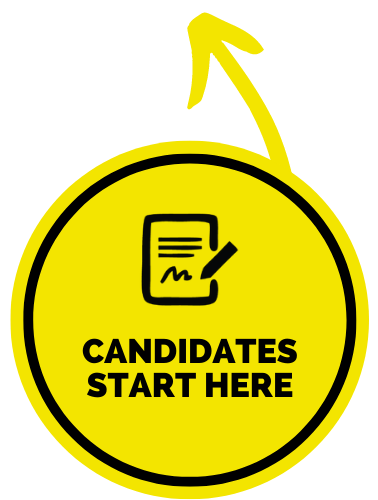
As Recruiters and hiring employers, it can be tempting to think of our role as “finding people jobs”. In reality, much of our success in helping match candidates to roles comes from our partnership with the candidate. Successful hires only happen when there is understanding and trust between the Recruiter and the candidate. To help with this, here are 5 things your candidates wish you knew.
1. “I’m reaching out because I need your help.”
Some candidates apply directly for specific roles. Other candidates send their CVs in a general email asking to be considered for anything suitable. In both instances, these candidates are reaching out to you, the Recruiter, because they need your help. 73% of job seekers claim that job seeking is one of the most stressful life events.
The internet makes it quicker and easier than ever to find job openings, but in some cases this isn’t enough. Sometimes Recruiters are working on roles that aren’t advertised publicly. Sometimes, even though they aren’t suited for the particular role they are applying for, candidates rely on your database of clients to find something similar that works better for them. And even if they’re applying directly, they need your help to motivate them to your client.
Even if you don’t have a role for the candidate at the moment right now, you can still help by giving them tips and info that will help them on their job search. Know of useful places to network? Have some great interview or CV-typing tips? Do you provide salary comparison services? Send these to your candidates! It shows that you’re serious about helping and means that they’ll be more likely to reach out to you for future roles.
2. “I really want feedback from my Recruiters.”
With so much of our lives taking place digitally, communication overload is a real thing. But for candidates, this communication link is vital. It’s the only way they know if they’re on the right track. According to Thrive My Way, an unsuccessful candidate who doesn’t get any feedback is twice as likely to never use or apply to that company again. This means that you could be losing out on great talent for future roles, especially if you gain a reputation for not providing feedback.
The feedback that you provide doesn’t have to be incredibly detailed. Candidates just want to know if there is any promise in their application or if they should move on to other opportunities. Here are some ideas on how to provide consistent updates:
- Create a template for applicants who aren’t shortlisted
- Let them know that they weren’t successful this time
- Make sure to add helpful info or advice like job seeking tips, a link to your other available vacancies, or a link to your blog/YouTube channel for more advice
- If a candidate asks for information on why their application was unsuccessful, give it to them
- Candidates aren’t doing this to be rude or question your motives – they want to know what they can do to improve future applications
- Provide some brief feedback along with advice on what to look out for going forward
- Set a day for updating all your active candidates and communicate this to them
- If you set Thursday as your update day, for instance, let the candidate know that you send updates on Thursdays
- Make it clear that you will be in contact earlier if there is any news before then
- ALWAYS provide an update even if nothing has changed since the last one
3. “Yes, I’m overqualified, but I still want this job.”
For many recruiters, our gut reaction is to see that someone is too qualified and immediately reject them. We worry that they’ll ask for too much, or that they’ll quickly get bored of the role and look for something more challenging. But there are many reasons someone might be looking for work below what they’re qualified for. The candidate may be recovering from or living with an illness or disability that means they need a less challenging role. Perhaps they are looking for a better work/life balance and a role that makes fewer demands on their time. Maybe the role that they’re applying for is with a company or in an industry that the candidate is passionate about.
There are a great many benefits to giving a role to someone who is overqualified. They can offer expertise and perspectives other candidates might not have. They might be more efficient in their processes after having to juggle more demands in their previous role than their current one. If a candidate is passionate about the role, it can boost morale and motivation in the office.
Always make sure that you’re communicating effectively with your candidates. Check that they understand that the scope of the role and the pay would be different to what they’re used to. Find out why they’re passionate about applying for this role so that you can motivate this when you send them to the client.
4. “I want Recruiters to consider me for future roles.”
If a candidate’s application is unsuccessful, it means they are still on the job market. This means that they’re in the same position as they were at the beginning of the process. You can save you and your candidate time by keeping in contact with candidates you know are still actively job seeking.
Create a database of candidates you can pull from first before opening it up to the wider job market. Keep your candidates informed of new roles that come in. You save the time, money, and effort that you’d have to spend on building a new relationship with a candidate if you reach out to a candidate you already have a relationship with.
5. “My time and circumstances are just as important as yours.”
This touches on a lot from the previous points, but candidates want to know that you value them. They’re also juggling multiple things at once – job seeking, work, relationships, family, extra murals, etc. This means that you may need to be understanding when a candidate doesn’t get back to you right away. You need to be considerate of when and where you contact them (especially if they are currently employed). If they can’t make the interview time that your client provides, you may need to negotiate on their behalf to find a time that they are able to.
As much as you are providing a service to your client in finding them someone for their team, you’re providing a service to your candidates. You’re their representative during the hiring process – the one who markets their skills and motivates their fit with the company. Make sure that you’re building a relationship with them that’s built on respect and cooperation from your side as well as theirs.
Remember:
At the end of the day, you and your candidate are on the same team. By working together, you can make the hiring process simpler, quicker, and beneficial to both you and the people relying on you to help them get the job.









